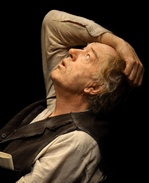SITE GUIDE
SEARCH
REVIEWS
REVIEW ARCHIVES
ADVERTISING AT CURTAINUP
FEATURES
NEWS
Etcetera and
Short Term Listings
LISTINGS
Broadway
Off-Broadway
NYC Restaurants
BOOKS and CDs
OTHER PLACES
Berkshires
London
California
New Jersey
DC
Connecticut
Philadelphia
Elsewhere
QUOTES
TKTS
PLAYWRIGHTS' ALBUMS
LETTERS TO EDITOR
FILM
LINKS
MISCELLANEOUS
Free Updates
Masthead
Writing for Us
A CurtainUp  London Review
London Review
 London Review
London ReviewKrapp’s Last Tape
|
With all this darkness around me, I feel less alone. — Krapp
|

Michael Gambon as Krapp (Photo: Anthony Woods) |
Krapp is celebrating, or better to say commemorating (since this accords with the funerary feel of his humour) his sixty-ninth birthday. As is this sad and broken man’s custom, the occasion is marked by Krapp listening to a recording of his own voice made thirty years before. Finding the correct tape from a ledger that acts like a bureaucratic repository for his memories, Krapp inserts the spool of tape onto the revolving nipples of his aged recording device, clumsily searching for the right moment in his life’s story.
For the first fourteen minutes of the play, the actor onstage utters not a word. Discovered asleep and crumpled over the desk, his every painful movement one of paranoia and OCD precision, the play’s ‘hero’, Krapp, shuffles and grunts, preparing his grubby world for the ritual recording session that punctuates his dismal life. Michael Gambon is the latest manifestation of Krapp, a role specifically written by Beckett for the wild-eyed Irish actor Patrick Magee.
Our awareness that Beckett had heard Magee in a radio broadcast and written this short scene solely for this enigmatic character star colours our appreciation of the theatricality of this unusual piece. Most of the dialogue is spoken not in the live theatrical setting, but as pre-recorded sound. A technically difficult play, with taped cues that must work in synch with the live actor, Krapp’s Last Tape demands that the protagonist listens and responds to a voice from another time in his life, a conceit both effective and, at the same time, somewhat unnerving.
With a running time of less than an hour, Krapp’s Last Tape should feel like a rollercoaster ride of emotion, expressed through anger, frustration and decay. There is certainly frustration, there is certainly decay, and, as Krapp smashes to the floor the tin boxes that contain his life in reel-to-reel voice-recorded detail, there is also anger. But rollercoaster? The recurring imagery of a gently swaying river punt seems more suitable a description for this bittersweet testimony of love and opportunity lost.
Krapp’s ‘younger’ self, a stronger disembodied voice that seems full of expectation and hope, regales his ‘older’ self with tales of bygone lust and sexual exploration. Like a torturer hovering over his victim, ready to apply the fatal electrode to already raw and sensitive flesh, this ‘other’ voice likewise hovers over the broken man we see now, the memories that come flooding back as painful to endure as any wielded scalpel.
As Krapp, Gambon is, of course, the consummate performer. We feel safe in his expert hands. It seems surprising, therefore, that this great actor, born as he was in Ireland, should offer so unconvincing an Irish accent. This is the ‘Sir Michael’ we know and love, occasionally giving a nod towards his Irish roots, but never fully convincing us of any specific national heritage.
Despite this minor quibble, Gambon’s performance is solid and dependable. His Krapp a broken individual for whom death will inevitably seem a welcome release from the absolute drudgery of existence. At least with diaries there is the privacy of internalized retrospection. With a taped journal amassed over several decades, privacy is lost as an alternative reality plays out its aural anxiety for all to hear.
Krapp’s Last Tape is a fascinating vehicle for the older actor, renowned for his voice. It is a play about voice, about sound, about the pictures a voice can conjure. It is pure radio translated into a stage play, with the listener and the speaker divided by a lifetime. No rollercoaster, more a sedate ghost-ride through someone else’s haunted memories, a ride that, as we leave the auditorium, we are glad to have experienced if not necessarily shared.
|
Subscribe to our FREE email updates with a note from editor Elyse Sommer about additions to the website -- with main page hot links to the latest features posted at our numerous locations. To subscribe,
E-mail: esommer@curtainup.comesommer@curtainup.com
put SUBSCRIBE CURTAINUP EMAIL UPDATE in the subject line and your full name and email address in the body of the message -- if you can spare a minute, tell us how you came to CurtainUp and from what part of the country. |
| Krapp’s Last Tape
Written by Samuel Beckett Directed by Michael Colgan Starring: Michael Gambon Lighting: James McConnell Running time: 50 minutes without an interval Box Office: 0844 579 1973 Website: http://www.duchesstheatre.co.uk/current-show.htm Booking to 20th November 2010 Reviewed by Kevin Quarmby based on 23rd September 2010 performance at the Duchess, Catherine Street, London WC2B 5LA (Tube: Covent Garden) |
|
REVIEW FEEDBACK Highlight one of the responses below and click "copy" or"CTRL+C"
Paste the highlighted text into the subject line (CTRL+ V): Feel free to add detailed comments in the body of the email . . . also the names and emails of any friends to whom you'd like us to forward a copy of this review. For a feed to reviews and features as they are posted add http://curtainupnewlinks.blogspot.com to your reader Curtainup at Facebook . . . Curtainup at Twitter Subscribe to our FREE email updates: E-mail: esommer@curtainup.comesommer@curtainup.com put SUBSCRIBE CURTAINUP EMAIL UPDATE in the subject line and your full name and email address in the body of the message |
|
London Theatre Tickets Lion King Tickets Billy Elliot Tickets Mighty Boosh Tickets Mamma Mia Tickets We Will Rock You Tickets Theatre Tickets |




